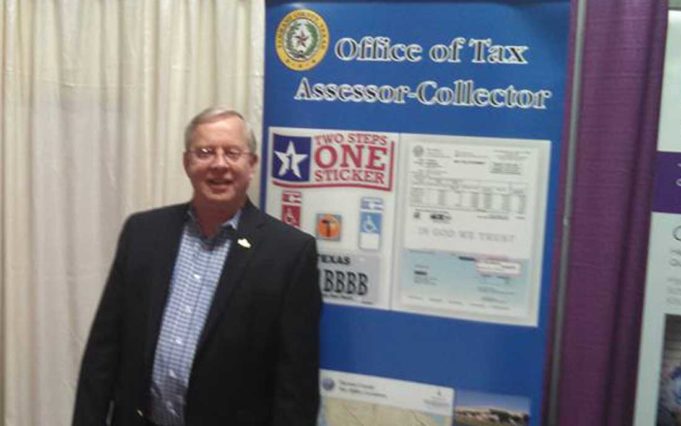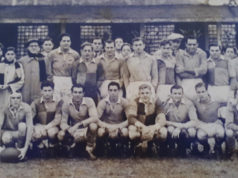“This article is not true … so WTF?” is one of several online comments I received after a recent story. In “Confessions of a Scofflaw” (May 3), I wrote that “tickets generated by red light cameras aren’t worth the paper they’re printed on,” going on to say that motorists who receive a citation after their vehicles are photographed running through a red light could file those tickets in the circular cabinet without repercussion.
Another wrote: “Same here, I have a scofflaw hold, too, from Fort Worth.”
Since 2011, a statewide “scofflaw” rule allows county tax assessor-collectors to place holds on the auto registrations of licensed drivers who don’t pay their red-light camera tickets. That law is the only leverage that cities currently have. Motorists in some counties are unable to have the holds released unless they pay their tickets first.
However, some county tax assessor-collectors have refused to enforce those holds. Tarrant County’s Ron Wright is among them. So local motorists have no reason to pay red-light tickets issued by cameras, unless these folks just feel like giving money to the city, state, and camera vendors, who all divvy up the money.
Several callers expressed similar complaints about the story, saying they were unable to release the holds on their auto registrations without forking over money: $75 with an extra $25 added for late fees. Half of the money goes to the state to help pay for regional trauma centers. The rest goes to cities that typically pay red-light camera vendors to install and maintain the equipment in exchange for a cut of the action. Revenues are in the tens of millions of dollars statewide.
Readers who complained about our article described various situations in which they went to renew their registrations but were prevented because of scofflaw holds. However, in each of those cases, the motorist was attempting to renew his or her registration at a retail outlet such as a Walmart or Fiesta. Circumventing the hold requires renewing your registration through the mail or in person at one of the eight tax assessor-collector locales spread around Tarrant County, not at the supermarket.
“We will process their registration,” tax collector Wright told me. “If they try to do it in a grocery store or online, the [state] system will not allow that registration to go through. But if they come to our office, we override that and issue the registration.”
Fort Worth allowed the implementation of red light cameras in January 2008. Currently there are 58 cameras at 44 intersections generating about $9 million a year in fines. After paying the camera vendor about $3 million, Fort Worth and the state split the rest. Fort Worth also collects late fees that do not have to be split with the state. Fort Worth spends its share on traffic signals and signs and other intersection improvements to eliminate accidents.
About 37,000 citations were issued in Fort Worth in 2008. That number has increased every year, according to records provided by the city. In 2016, more than 231,000 citations were issued. That would have generated $17 million if everyone paid his fine on time.
But many motorists have stopped paying the fines altogether over the years because unpaid red-light camera tickets don’t lead to arrest warrants or bad credit reports. Some counties began relying on the scofflaw rule passed in the late 1990s to allow them to place holds on auto registrations for unpaid traffic fines, including red-light camera tickets.
City officials have long praised the cameras for improving traffic safety. A city official provided a fact sheet that shared information and safety studies done statewide and in other cities, but little of it is specific to Fort Worth. Examples: Nearly a fourth of all traffic fatalities in Texas in 2015 occurred at or near an intersection. In 2016, the Insurance Institute for Highway Safety said red light cameras in 79 large U.S. cities saved almost 1,300 lives. And a Houston Chronicle report showed that in the four years after Houston banned the cameras, crashes increased 117 percent and fatal collisions rose 30 percent.
Former tax assessor-collector Betsy Price had quietly begun enforcing the registration holds before she became mayor in 2011. Her replacement, Wright, ended the practice after taking office. He recalled receiving a visit from a group of city staff members not long afterward urging him to enforce the holds. They said his refusal to block registrations was costing the city $87,000 a week, Wright said. None of them mentioned safety, he said.
Wright said he told the group that it was not the tax assessor’s role to collect ticket money or enforce holds on registrations as leverage over motorists. He felt it was the city’s responsibility. At the same time, other cities around Tarrant County were asking his office to enforce the holds for them as well. Wright made a blanket refusal.
“It’s a bit awkward because I have contracts to collect taxes for all these taxing entities, including all but two of the cities” in Tarrant County, he said. “I can understand why they would want me to do it, but I’m not going to, and they’re not happy about it. I’m not backing down on this.”
Wright consulted with Tarrant County commissioners, who “had no appetite for it either,” he said.
Proponents say the cameras promote safer driving by slowing down motorists at intersections, thus reducing accidents and fatalities. Critics say the cameras violate civil liberties since they operate on the basis of guilty until proven innocent. Tickets also are issued to the owner of the vehicle rather than the driver. And around the country, critics have claimed that cities reduce yellow light times to increase the number of red light violations – thereby increasing revenues.
The National Motorists Association, a nationwide grassroots alliance since 1982, keeps track of cities using short yellow light times. Dallas made the list in 2007 after an investigation by KDFW-TV found that the 10 red light cameras that generated the largest number of citations were at intersections with yellow lights shorter than the minimum recommended by the Texas Department of Transportation.
Wright and the county commissioners aren’t the only ones resisting the trend toward making tax assessors the high sheriffs when it comes to red-light cameras. Wright is among the dozens of conservative leaders and grassroots activists around the state to sign a letter to Gov. Greg Abbott on June 26 asking him to put the issue before lawmakers in this year’s special session, which began on Tuesday.
“We need your support to ban red light cameras, period,” the letter said.
The Texas Senate has voted to ban red light cameras in recent years, but the bills have stalled in the House.
“Every now and then, the elected officials have to listen to the people they represent,” Wright said. “The people don’t like these [red light cameras]. One of the really basic tenets of our justice system says you get to face your accuser. In this case, your accuser is a machine.”













Actually you don’t have to pay your SCAMera ticket no matter what county your vehicle is registered in. Many counties make it easier like Tarrant, Harris, Montgomery and Neuces Counties to name a few but there are always ways around the block.
Ron Wright is a true hero!
Red light cameras produce profits above their own high $4,000 to $5,000 per month per camera costs ONLY when the yellow intervals are left or set too short for the ACTUAL perception/reaction times and ACTUAL approach speeds of at least 85% of the drivers.
Red light cameras are for-profit rackets that require timing the yellow intervals improperly for less safety and more tickets. The IIHS should be known as the Insurance Institute for Higher Surcharges because they have a massive conflict of interest in supporting the for-profit ticket camera rackets because in some states IIHS member companies can surcharge the insurance premiums of safe drivers who get tickets at lights with deliberately too-short yellows.
NO ONE should support these for-profit ticket camera rackets – they are essentially larceny.
James C. Walker, National Motorists Association
Is factual news or fake?
Truth!
I got a red light camera ticket in Hurst for turning right on red! I didn’t contest it because I knew it wouldn’t make a difference, plus, who has time for that? Today I received my threatening letter in the mail informing me of my registration hold. I’m standing my ground by not paying the unfair ticket. These red light cameras have got to go!
Any update on the ticket or the threatening letters? I got a ticket in the mail today from Precinct Line Rd & Bedford Euless Rd, Hurst, TX. Not sure if I should pay $75. This is my first ever ticket and there was no way I would have applied breaks and stopped in the middle of the road.
Did you win!😁 David
Mr Prince,
What if I mailed my renewal in? So I am not having to go in to renew.
Thanks!!
You should be OK if you mail it directly to the tax assessor-collector
I am from out of state and got a red light camera ticket from Haltom City. Should I be good to go to throw it out?
The only leverage the state has to force you to pay the ticket is to withhold your car registration. But you live out of state and get your registration elsewhere, so, I’m no lawyer but I would think you could file that ticket in the trash.
Thanks, I was in a rental car, so I think I will have to pay the rental car company the $30 fee for them having to transfer liability to me, but once it is on me I can then hopefully just toss it in the garbage!
DO NOT PAY THEM. I intentionally don’t stop at night when the intersection is clear and I am turning red JUST to get them. I’d say I have around 16 in the last 7-8 years and have gotten my registration renewed online almost every year (last year I got my inspection done the same day I tried to renew online and waited 24 hours but still got an error so I had to mail it in) other than one time I mailed it in. I live in Tarrant County and two years ago it even said “Ciry Scofflaw – Haltom City” on my registration renewal letter meaning I had a “hold” but had no issue renewing online. I know for a 1000% fact you can’t have your registration held in Tarrant County but after doing research tonight I found out nowhere in Texas can they legally hold your registration after SB87 passed in 2017 (I think that’s the bill).
I received a phone call today from a red light camera collections office threatening to hold my registration (I told her that threat is bull shit and explained why) so she moved on to “they’ll boot or tow your car” and I explained that they cannot boot or tow my car for unpaid civil penalties and asked for her to provide me with the statute but her response was “it doesn’t say that on this website, I live in Ohio so I am unaware of the law in Texas”. I told her I’m not paying it and they aren’t going to hold my registration, tow my car or boot it or put it on my credit… if you can find another way to punish me for something you can’t even prove that I am guilty of then go for it but without actual proof that it was me that made the decision to drive through a intersection that changed to red then I might have a different answer for you. She didn’t like my answers and now that I know more I am going to really have ammunition to argue with them until they realize their job enforcing camera tickets and stealing $100 from mostly low-income families makes them the scum of the earth along with the Nigerian scammers who steal from the uneducated, lonely and elderly. I have no sympathy for these debt collectors.